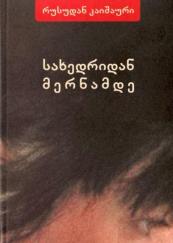FROM THE DONKEY TO MERANI
‘She has created a totally new sector, her own niche in Georgian poetry, by portraying the image of a woman triumphing over the everyday.’
Mariam Tsiklauri, poet
‘For a woman to have five children, and to be a single mother as well, widowed at an early age, and living in this country, which is designed so that many a living creature can disappear without trace, is something that really never occurred to me…’
Naira Gelashvili, writer, critic
‘The path from pack-animal to noble steed sometimes passes through the kitchen. The main thing is who is busy in the kitchen, because the usual crockery, spoons, forks, knives and plates can bang about with the most divine music: someone tormented in everyday life may start speaking the language of truth and tell us countless things about women who are actually completely peculiar, even though at first sight ordinary. Rusudan Kaishauri is just such a woman and just such a poet.’
Giorgi Lobzhanidze, poet, critic
EXTRACT
Translated into English by Natalia Bukia-Peters and Victoria Field
WOMAN AS A TABLE
That was time when the woman was
a writing table.
She bustled about with knives next to the stove.
When she used the clothes line
to tie up the wind,
she wrung out the dreams cherished by the family.
She kept her children sitting in all the drawers,
she wound up her heart using a key.
She was so tired
that she stayed up all night writing poems.
This woman once
Bent her back,
remained like that and never took of flying.
The brazen chair held itself out for her without even enquiring
whether this was actually a woman or a table.
In case of using the information, please, indicate the source.
